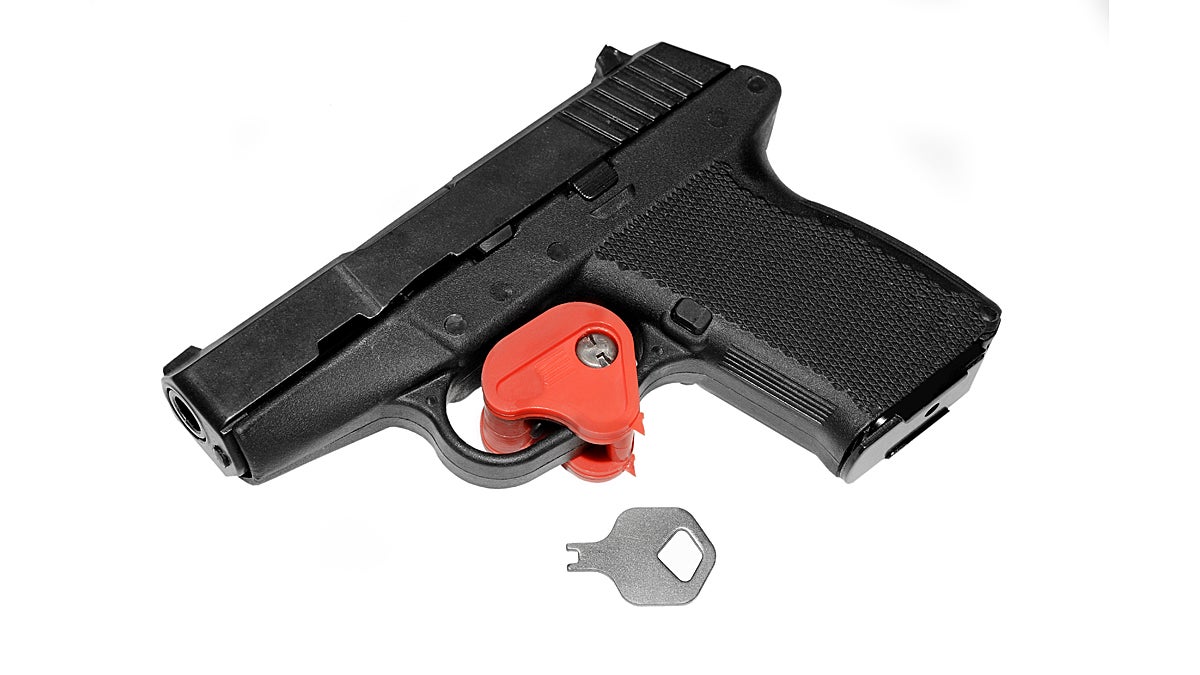Lacking Child Access Prevention law, Pa. in the middle of the pack on gun regulation
 Photo via ShutterStock) " title="gunlockx1200" width="1" height="1"/>
Photo via ShutterStock) " title="gunlockx1200" width="1" height="1"/>
(Photo via ShutterStock)
The .32-caliber semi-automatic handgun that Delaware County teen Cayman Naib used to kill himself had a trigger-locking mechanism in place. However, it was not properly installed and did not prevent the gun from firing.
Still, the fact that it was on there was already a step beyond what the Pennsylvania law on firearms requires.
A gun dealer is required to sell a trigger lock with all handgun purchases, but an owner is not required to use it. In fact, there is no regulation at all on how a gun is stored in the home, and no penalty for negligent storage.
Pennsylvania is hardly alone. Only 18 states have enacted Child Access Prevention laws since 1981, none within the last decade. And gun storage or trigger-locking regulations don’t exist at the federal level either.
Where they are in place, regulations range from strict – Massachusetts requires guns to be stored with safety devices – to more of a focus on the penalties should a minor get hold of a gun.
New Jersey falls in the latter category — though it doesn’t require a gun to be locked up, owners could face jail time and a hefty fine if a minor picks up a gun. Overall, the Garden State has some of the toughest gun laws in the country.
In Pennsylvania, you can’t intentionally provide a minor with a gun, but that’s about it.
Jon Vernick, a professor and co-director of Johns Hopkins Center for Gun Policy and Research, said Pennsylvania falls right about in the middle of the pack for gun regulation.
“Pennsylvania has long been known for having a much richer hunting culture, especially in the more rural parts of the state, than does New Jersey,” said Vernick. “People are concerned about whether gun laws will interfere with law-abiding hunters engaging in their pastime.”
Still, he said, even states known for their gun enthusiasts, such as Texas and Florida, have stricter CAP laws than Pennsylvania.
“This ought not to be as controversial as some other kinds of gun laws usually are,” said Vernick. “New Jersey didn’t enact its relatively comprehensive gun laws all at once, it was one by one. Pennsylvania could do the same thing, and CAP laws would be a good place to start.”
Statistics that lend support to CAP laws, or gun storage in general, can quickly start piling up.
Research published by the American Medical Association in 2004 found that suicide rates among 14- to 17-year-olds dropped by 8.3 percent in states where CAP laws were in place.
An article in Pediatrics in 2005 found that 1.69 million kids under 18 live in a house with an unlocked gun; another the same year in Pediatrics and Adolescent Medicine stated that 73 percent of those children under 10 years old knew where that gun was.
Additionally, a 1999 study published in the Journal of Pediatrics and Adolescent Medicine found that more than 75 percent of guns used in suicide attempts and unintentional injuries came from the home of the victim, a relative or a friend.
Laws over proper storage are tough to enforce before a tragedy, but Vernick said even a well-publicized rule can have an effect.
“There is evidence that states that do a better job of publicizing their CAP laws do an even better job of having those laws reduce accidents and suicide,” said Vernick. “Its not always necessary to engage in very elaborate enforcement efforts for a law to be effective. But without this kind of law, we’re sending a terrible message to people about the kind of storage of a gun that’s appropriate.”
The NRA did not return a request for comment.
WHYY is your source for fact-based, in-depth journalism and information. As a nonprofit organization, we rely on financial support from readers like you. Please give today.

